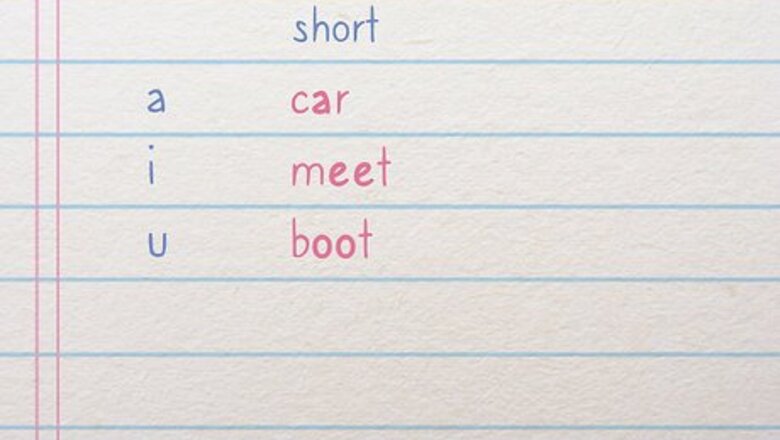
views
X
Research source
Perfecting Your Pronunciation
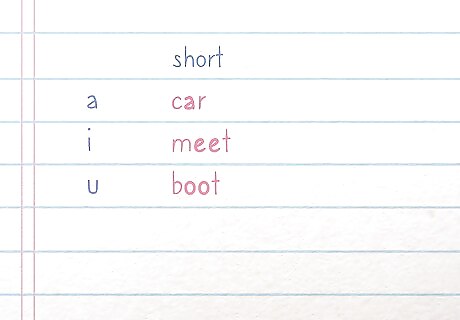
Start with long vowel sounds. Vowel sounds are the foundation of pronunciation in any language. Jamaican Patois has the same 5 vowels you're familiar with in English, a, e, i, o, and u. However, there is no long o or long e sound in Jamaican Patois. In the written form of the language, long vowels are typically represented as a double-vowel. The long a (aa) sounds like the "a" in the English word "car," or the word "last" using British pronunciation. The long i (ii) sounds like the "ee" in the English word "meet." The long u (uu) sounds like the "oo" in the English word "boot."
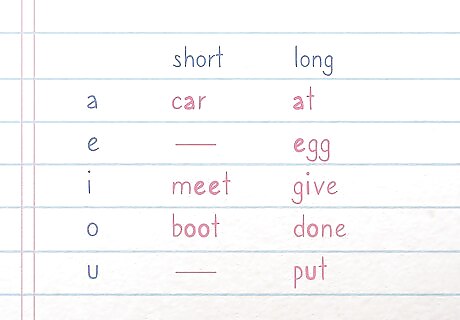
Continue with short vowel sounds. All 5 vowels have a short vowel sound in Jamaican Patois. Most of these are similar to the short vowel sound you're already accustomed to hearing and saying in English. The short a sounds like the "a" in the English word "at." The short e sounds like the "e" in the English word "egg." The short i sounds like the "i" in the English word "give." The short o sounds like the "o" in the English word "done." The short u sounds like the "u" in the English word "put."
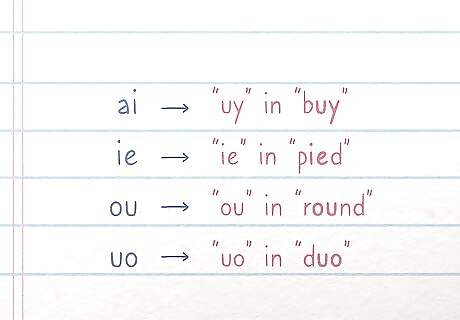
Practice Jamaican vowel diphthongs. Jamaican Patois includes 4 diphthongs, which are created when two vowels next to each other are blended to create a new sound. Some of these are similar to English, but many are not. An ai sounds like the "uy" in the English word "buy." An ie makes a yeh sound, similar to the "ie" in the French word "pied." An ou sounds like the "ou" in the English word "round." A uo sounds like the "uo" in the English word "duo."
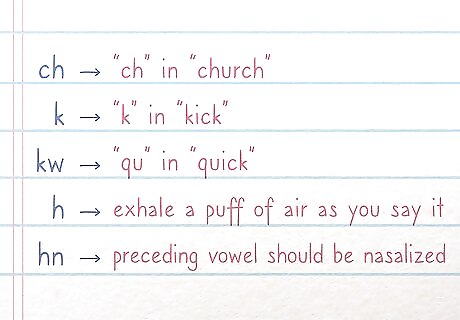
Learn Jamaican consonants that differ from English. Since Jamaican Patois evolved from English, it uses most of the same consonants. For the most part, they also have the same sounds in Patois as they do in English. However, there are a few that are different. Ch is pronounced like the "ch" in the English word "church." The only time the letter "c" is used in Jamaican Patois is with a "ch." The rest of the time, it is replaced with "k." The letter k only produces a hard sound, as in the English word "kick." The consonant combination kw replaces the letters "qu" and sounds like the "qu" in the English word "quick." The letter "q" is not part of the Jamaican Patois alphabet. The letter h is used as an aspirate, meaning you exhale a puff of air as you say it. It is used before words that begin with a vowel, especially when the previous word ended with a vowel. However, it is optional and not used in some Patois dialects. The combination hn indicates that the preceding vowel sound should be nasalized.Tip: Jamaican Patois evolved as a spoken language and its spelling is phonetic. There are no strict spelling rules, so you may see words spelled differently. However, they still mean the same thing.
Using Common Words and Phrases
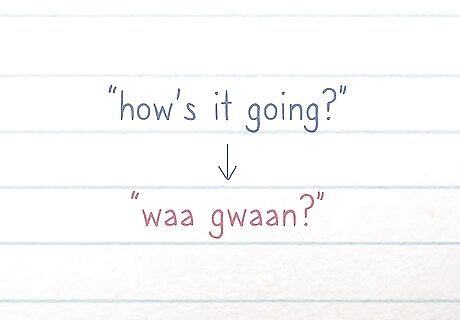
Greet Jamaicans with "waa gwaan?" "Waa gwaan" is by far the most common way to great people in Jamaica. The phrase is more accurately translated to mean "how's it going" or "how are you doing," but it is also used as a general "hello." Other ways to say "hello" include "ello," "hail up," or simply "gud day." If you're traveling in Jamaica, it's a good idea to say this only if the other person says it to you first. If they say "hello" or "hi" to you, say the same back. It might seem condescending to use this greeting if you are clearly a foreigner.
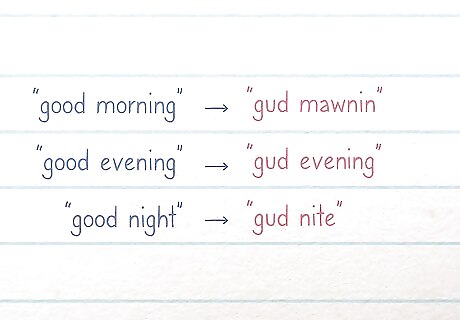
Vary your greeting depending on the time of day. Just as in English, you can use different greetings in the morning, evening, and at night. These greetings are roughly similar to what you would say in English. Gud mawnin: good morning Gud evenling: good evening Gud nite: goodnight
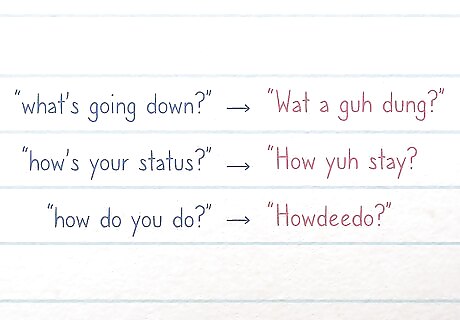
Try alternatives to ask how someone is doing. While "wa gwaan" is sufficient both to say "hello" and ask the person how they're doing, you can also combine it with another phrase. One such phrase is "weh yuh ah seh." You can literally translate this phrase as "what are you saying," but it's used to mean "how are you doing." Other alternatives include: Wat a guh dung?: literally "what's going down?" How yuh stay?: literally "how's your status?" Howdeedo?: "how do you do?" (more common among older people)
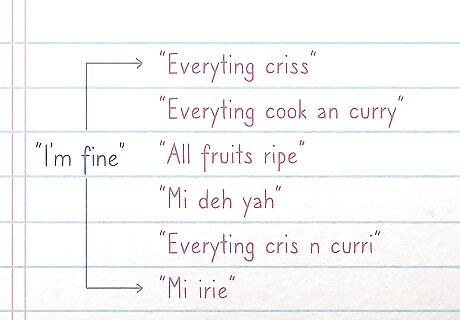
Respond when someone asks how you're doing. If someone asked you how you were doing in English, you'd probably respond "fine" or perhaps "I'm well." In Jamaican Patois, there are numerous ways to say you're doing well. If someone speaks to you first in Patois, you might use one of these responses. Some examples include: "Everyting criss" "Everyting cook an curry" "All fruits ripe" "Mi deh yah" "Everyting cris n curri" "Mi irie"Tip: Because Jamaican Patois is a relatively informal language, there aren't different ways to address someone if you want to show respect. While some phrases may seem more casual than others, they're all appropriate regardless of the context.
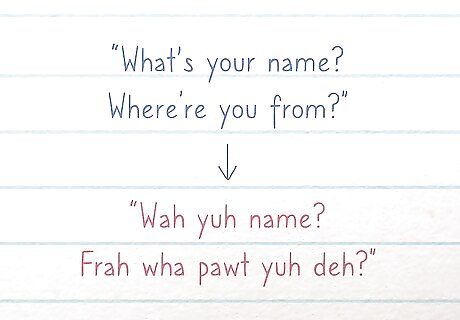
Introduce yourself and talk about where you're from. After you great someone, they may say "Wah yuh name?" or "What's your name?" Reply by saying "Mi name" followed by your name. You can then turn the question around to them, or simply say "yuh?" If you want to ask the person where they're from, say "Frah wha pawt yuh deh?" If the other person asks you this question, respond "Mi deh" followed by the name of the place where you're from.
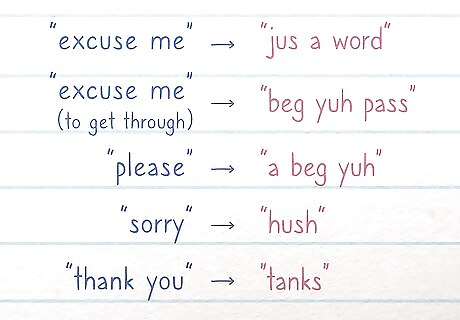
Add in polite words and phrases to show respect. Generally, Jamaican is a casual language. There's not much emphasis placed on being polite or formal. However, native speakers will appreciate if you're polite and mind your manners. Some words and phrases to learn include: Jus a word: "excuse me" Beg yuh pass: "excuse me" (when you need to get through or past someone, as in a crowd) A beg yuh: "please" Hush: "sorry" Tanks: "thank you"
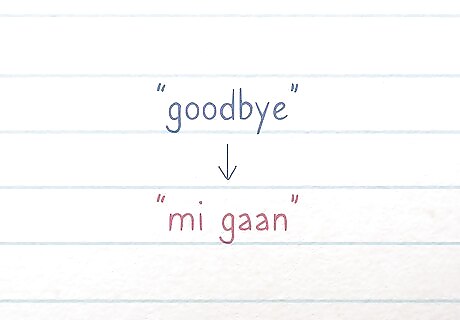
Say "mi gaan" when you have to part ways. The phrase "mi gaan" literally means "I'm gone," and is a common way to say "goodbye" in Jamaican Patois. You can also say "likkle more" or "likkle more den," both of which essentially mean that you'll see the person later. Another common expression when parting ways in Jamaica is "walk good." While this is more or less English, it's used to mean "take care." This expression is most commonly said to someone who is traveling a longer distance.
Understanding Jamaican Grammar
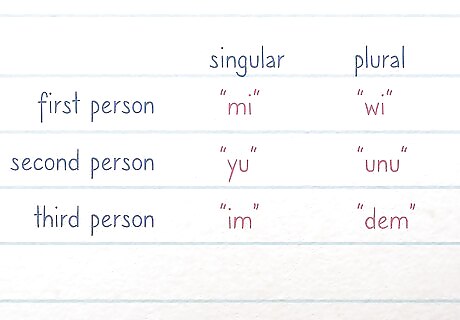
Use 3 singular and 3 plural pronouns. Jamaican Patois pronouns do not change if used as the subject or object of a sentence, unlike in English, where you would use "I" for the subject of the sentence and "me" for the object. You also don't change the pronoun to show possession. You simply use the appropriate pronoun. There is a singular and plural pronoun for first (I/we), second (you), and third person (he/she/they). First person: "mi" (singular) or "wi" (plural) Second person: "yu" (singular) or "unu" (plural) Third person: "'im" (singular) or "dem" (plural)Tip: Although it sounds similar to the English pronoun "him," the Patois word "'im" is not gendered and can refer to any person. Jamaican Patois does not have a distinct female pronoun.
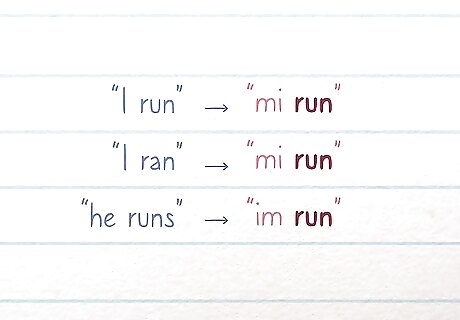
Leave verbs the same regardless of number or case. Unlike English and many other languages, verbs aren't conjugated and don't ever change form. Rather, what is meant is figured out from the context of the sentence and anything else said. For example, if you wanted to say "I run," you would say "mi run." In English, if you wanted to say "he runs," the verb form changes. However, in Jamaican Patois, you would simply say "im run."
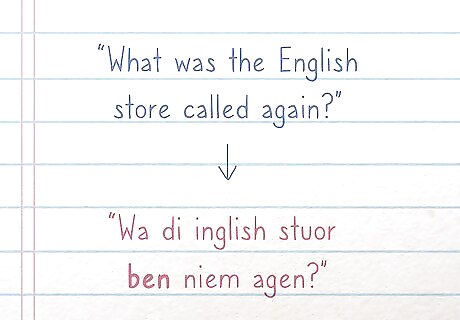
Add "ben" to express past tense. While past tense may be picked up from the context of the sentence, Patois speakers also add a verb before the main verb to mark past tense. "Ben" is most common, although you may hear variations, such as "men," "wen," "min," or "en," depending on the part of Jamaica and the age of the speaker. Older, urban, or highly educated speakers of Jamaican Patois may use "did" instead of "ben" to indicate past tense. It would also be put before the verb, for example, "Wa di inglish stuor did niem agen?" ("What was the English store called again?")
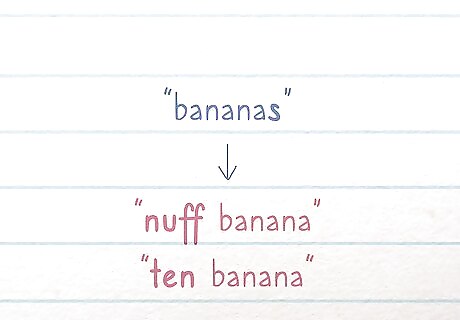
Form plurals by adding "dem" or "nuff." In standard English, you would typically add an "s" or an "es" to the end of a noun to make it plural. However, in Jamaican Patois, an "s" or "es" at the end of a word does not necessarily mean the word is plural. To indicate a plural, add either the word "dem" after the noun or the word "nuff" before it. The noun stays in singular form. Even though "nuff" evolved from the English word "enough," in this context it means "many" or "a lot." For example, if you had several bunches of bananas, you might say you had "nuff banana."Tip: You can also use a specific number before the noun to indicate that the noun is plural. Remember not to add an "s" or "es" to the noun. For example, if you had ten bananas, you could say "nuff banana" or "ten banana."
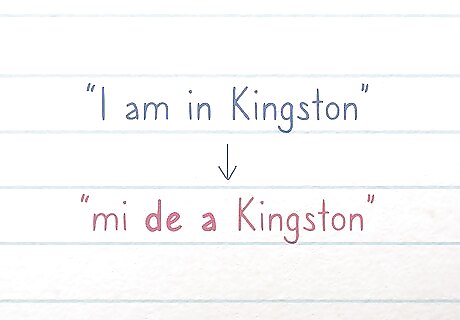
Express a state of being with "a" or "de." English has a single verb, "to be," used for all instances of being. Jamaican Patois, like Spanish, has two infinitives that express states of being. However, unlike Spanish, these verbs are not conjugated. A refers to being in a state or condition. For example, to say "I am a boy," you would say "mi a bwai." De refers to the place where you're located. For example, to say "I am in Kingston," you would say "mi de a Kingston." Note that the "a" here is not the verb, but a particle used to mean "in."
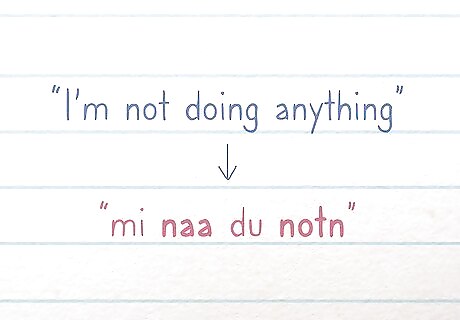
Emphasize negation with a double negative. While double negatives are frowned upon in English, they're allowed in most other languages, including Jamaican Patois. The double negative is typically used when the speaker wants to emphasize the negation. For example, you might say "mi naa du notn" to mean "I'm not doing anything."
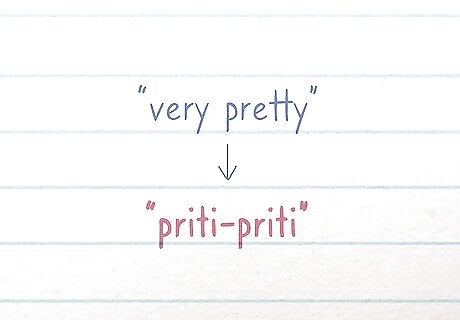
Double words to increase their effect or intensity. Repeating a word twice makes the meaning more intense. If you double an adjective, it's similar to adding "very" or "extremely" before the adjective. A doubled verb implies that the action is continuous or lasted for a long time. For example, "priti" means "pretty." "Priti-priti" would mean the thing described was very pretty or exceptionally pretty. Verbs are doubled the same way as adjectives. For example, the word "linga" means "linger." However, if you said somebody was "linga-linga," it would imply that they'd been dawdling or hanging around for a long time or an inappropriate length of time.
Practicing Your Jamaican Patois
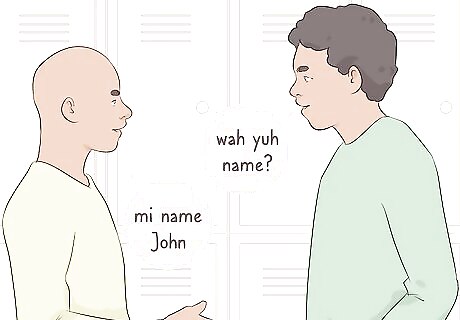
Speak Patois only if the other person speaks Patois to you first. If you just start speaking to Jamaicans in Patois, they may think you are condescending or making fun of their culture. Apart from this, English is the official language of Jamaican, so it's not as though you have to worry about people not being able to speak English. Some Jamaicans, particularly upper- and middle-class native islanders, consider Patois to be bad English or evidence that the speaker isn't well-educated. If you start speaking to them in Patois, they may be offended because you've inferred they are lower class or not well-educated.Tip: Even outside of Jamaica, a Jamaican may be offended or insulted if you suddenly start speaking to them in Patois.
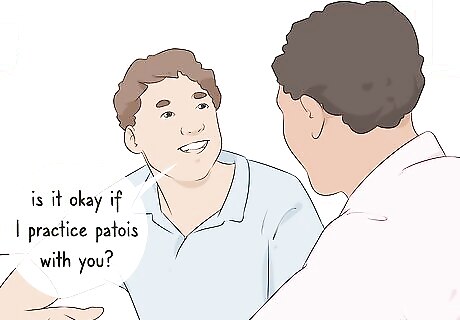
Ask permission to practice your Patois. If you know someone who speaks Jamaican Patois, or if you're in Jamaica and hear people speaking Patois, simply ask them about it. Express your interest in learning the language and ask if you can practice with them. If you approach someone with respect and acknowledge that Jamaican Patois is a language, they'll likely be happy to help you with your grammar and pronunciation. Even if they aren't interested in helping you, they won't be offended that you want to learn more about their language and their culture.
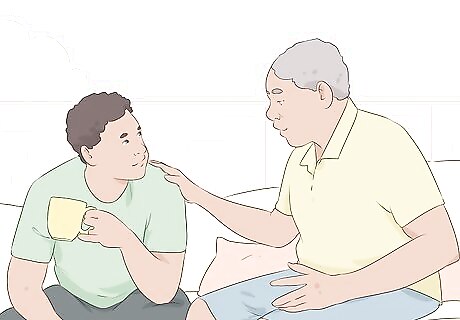
Get pointers from native speakers. There are relatively few resources online to speak Jamaican Patois, unlike many other languages. However, you can still seek out a conversation partner to help you with your grammar and speaking skills. If there is a Jamaican community or restaurant near you, start there. They may know someone who is willing to work with you. If you're visiting Jamaica, travel away from the more touristy areas if you want to speak Jamaican Patois. In more rural areas, you're more likely to find people who speak Patois and don't have any qualms about practicing with you.
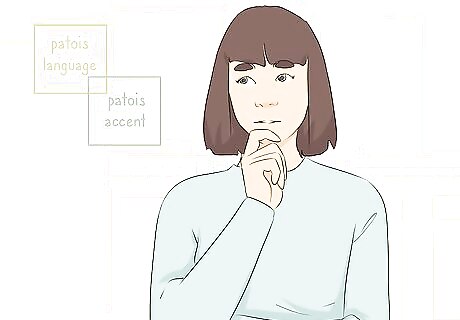
Recognize the difference between the language and the accent. If you want to learn how to speak Jamaican Patois, learn the pronunciation and grammar the same as you would for any other language. However, don't confuse speaking in a "Jamaican accent" with speaking in Patois. Trying to fake a Jamaican accent will come across as racist and rude. If you are practicing your Jamaican Patois and someone calls you out, explain that you are learning the language. If they remain skeptical or believe that you're being culturally insensitive, it might help to explain your passion for or interest in the language or talk about the finer points of grammar and pronunciation that you've learned.













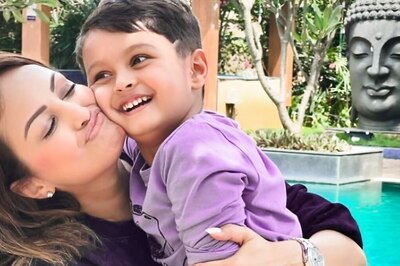





Comments
0 comment